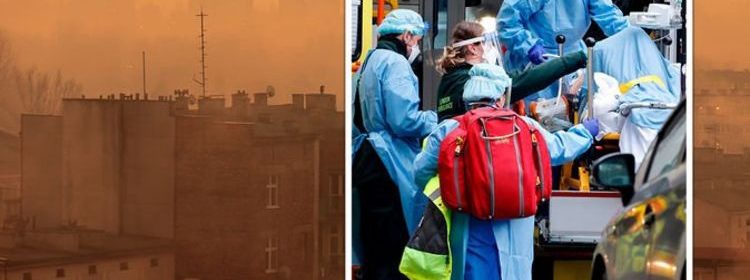Coronavirus cases and deaths are rising and a new risk factor has been identified – study

Coronavirus in numbers: Roundup of UK statistics
We use your sign-up to provide content in ways you’ve consented to and to improve our understanding of you. This may include adverts from us and 3rd parties based on our understanding. You can unsubscribe at any time. More info
At first glance, the UK is now over the worst of the pandemic – workers are flooding back into the city and restrictions have been lifted across the board. The positive picture can be attributed to natural immunity and a ramped up vaccination effort. However, COVID-19 hospitalisations and deaths are steadily rising across the UK.
Amid this concerning trend, a new report has identified a novel risk factor for ending up in hospital with COVID-19.
A review carried out by Imperial College London has found long-term exposure to air pollution before the pandemic increased the risk of a person becoming sicker if they became infected with the COVID-19 and being admitted to hospital.
It also said exposure could increase a person’s likelihood of catching the virus, although studies into this effect are still in early stages.
Imperial’s environmental research group, a leading provider of air quality information and research in the UK, and the University of Cambridge MRC toxicology unit came to their conclusions after evaluating studies from across the world.

In the last year hundreds of studies into the links between air pollution and COVID-19 have been published, including research by scientists in the US linking smoke from the recent devastating wildfires with an increase in hospital admissions and deaths from the virus.
Imperial’s report said there is evidence that increased exposure to fine particulate matter is related to increased hospital admissions in those with COVID-19.
However, it said while there is some support for links between long-term exposure and worse health outcomes in those who have caught the virus, results may have other explanations.
Researchers also said studies showing air pollution could increase the likelihood of infection are still at an early stage.
DON’T MISS
Michael Schumacher health: Jean Todt visits tragic F1 star [INSIGHT]
Covid is surging and there is ‘only’ one vaccinated symptom [TIPS]
Dementia: The ‘first’ symptom of dementia [ADVICE]
The report said: “Air pollution is known to increase amounts or severity of respiratory or cardiovascular disease, and these diseases in turn are known to increase susceptibility to having more severe COVID-19. There are established biological mechanisms for the link between air pollution and disease in general.
“Whilst this study highlights that more research is needed in this area, it is already clear that tackling air pollution is important in reducing the vulnerability of the population to COVID-19, and other infections like it.”
In response to the report, The mayor of London has said “bold action” is needed to tackle air pollution.
Sadiq Khan, who commissioned the review, said he remains committed to expanding the ultra-low emission zone (ULEZ) next month, saying: “We cannot turn a blind eye to the clear evidence showing the dangers of toxic air pollution.

“We already know that air pollution is linked to life-changing illnesses, such as cancer, lung disease and asthma. But until now previous studies have underestimated the role air pollution plays in infectious diseases like pneumonia, bronchitis and, most recently, COVID-19.
“This new review led by Imperial researchers makes it crystal clear that tackling air pollution is a vital part of building our resilience to Covid-19, and other infections like it. The decisions we make now to tackle air pollution are truly a matter of life and death.
“That’s why I’m committed to expanding the ultra-low emission zone next month and why I will continue to take the bold action necessary to eradicate pollution from our city.”
Mr Khan said that decisions made to eradicate toxic air are now “a matter of life and death”.

Meanwhile, research continues to shed light on the ways to slash your risk of developing ‘long Covid’ and ending up in hospital.
Long Covid has come to mean symptoms of Covid that persist for 12 weeks or more, undermining quality of life.
According to research carried out by the ZOE COVID Study app, double vaccination dramatically cuts hospital admissions and acute symptoms.
The analysis found that for those who contracted COVID-19 after two doses were:
- 73 percent less likely to be hospitalised
- 31 percent less likely to experience acute COVID symptoms.
Source: Read Full Article